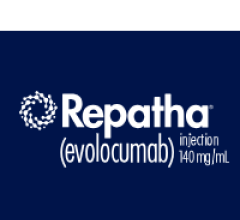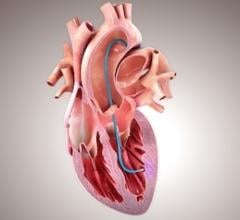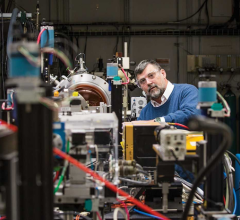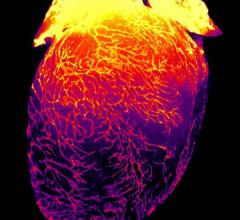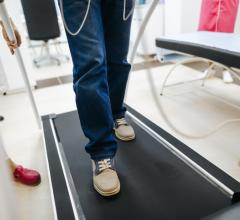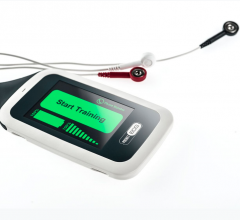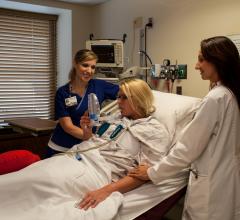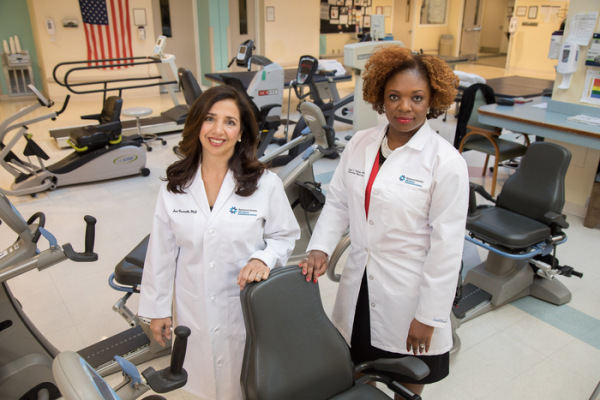
Sara J. Cuccurullo, MD, Chairman and Medical Director of the JFK Johnson Rehabilitation Institute and a Co-Principal Investigator, left, and Talya Fleming, MD, Medical Director of the JFK Johnson Stroke Recovery and Aftercare Programs and Co-Principal Investigator of the study. The physicians are in the rehabilitation gym where stroke patients exercise on recumbent bicycles. Credit: Hackensack Meridian JFK Johnson Rehabilitation Institute
May 5, 2022 – Survivors of serious stroke can reduce their chances of dying within the year by 76% if they complete a modified cardiac rehabilitation program that includes medically supervised exercise, prescribed therapy, and physician follow-up, according to new research published in the Journal of Stroke & Cerebrovascular Diseases. The findings have the potential to change the future of stroke care.
The study is the latest research from the ongoing Stroke-HEART Trials at Hackensack Meridian JFK Johnson Rehabilitation Institute, located in Edison, NJ, USA.
The study shows that participants in the JFK Johnson Stroke Recovery Program also significantly improved exercise capacity, mobility, self-care, and cognition.
“After a stroke, sometimes family members are cautious. ‘Don’t get up, you might fall.’ Many caregivers of stroke survivors discourage stroke patients from being active and mobile,” said Sara J. Cuccurullo, MD, Chairman and Medical Director of JFK Johnson and a Co-Principal Investigator of the study. “But we are showing that even survivors of serious stroke can exercise safely in a supervised program — and they can benefit enormously.”
The JFK Johnson Stroke Recovery Program (SRP) provides 36 sessions of medically monitored interval cardiovascular training — as well as follow-up visits with a Physical Medicine and Rehabilitation physician along with psychological, nutritional, and educational support and risk factor (such as smoking, diet, and exercise) management. The research found that stroke patients, even those who may experience hemiplegia, can exercise safely with some modifications, such as the use of recumbent bicycles.
The research follows survivors with strokes serious enough to require inpatient hospital rehabilitation at JFK Johnson. The study so far has included more than 1,600 stroke survivors. Because stroke can vary greatly from one survivor to the next, the study created a subgroup of patients closely matched for gender, race, type of stroke, age, medical complexity, and functional scores at hospital discharge.
Of 449 patients in this subgroup, 246 completed the program. Among the patients who completed the program, four died within a year of their stroke. Among the non-participants, 14 patients died. This translates into a four-fold reduction in one-year all-cause mortality.
The researchers hope the ongoing research will persuade the Centers for Medicare & Medicaid Services (CMS) to cover comprehensive stroke rehabilitation the same way cardiac rehabilitation is covered in people who have cardiac events; both stroke and cardiac events involve the vascular system.
“Stroke survivors deserve the same benefits that patients with cardiac disease receive. As a nation, we need to do more to help patients with stroke improve their lives — to improve both their longevity and quality of life,” commented Talya Fleming, MD, Medical Director of the JFK Johnson Stroke Recovery and Aftercare Programs and Co-Principal Investigator of the study. “We should enable stroke survivors to function in the community at the highest level possible.”
The study also found the Stroke Recovery Program participants improved in other ways. Participants saw a 78% increase in their cardiovascular capacity. (Many people with stroke also have cardiovascular disease.) The Stroke Recovery Program participants showed steady improvement in scores related to mobility, self-care, and communication/cognition. Research results show the matched pairs function similarly at the beginning of the study; over time, the study SRP participants perform better compared to the non-participants as they move forward with the Stroke Recovery Program.
“You see a real divergence,” Dr. Cuccurullo added. “What this means to patients is that instead of just walking around the house, maybe you can walk around the block. It means you can feed and take care of yourself at a much higher level of independence. We also see speech and cognition improve. Exercise has significant and multiple benefits associated with it, including promoting overall improvement in circulation, especially promoting enhanced circulation to the brain.”
The research continues. Future phases of Stroke-HEART Trials will include other rehabilitation institutes as the research expands nationally.


 September 19, 2025
September 19, 2025 
